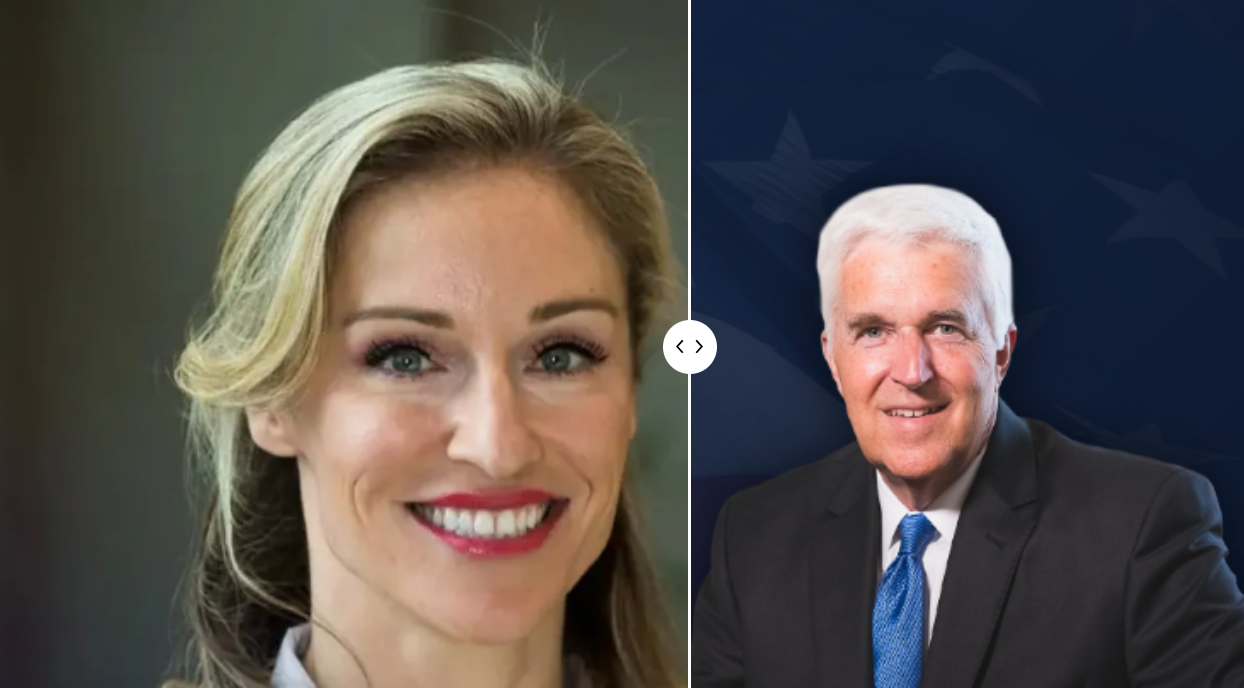Table of Contents


Explore the aftermath of a riveting electoral battle between Democrat Susanna Gibson and Republican businessman David Owen. Delve into the challenges faced by both candidates post-election, examining the impact of personal controversies, media dynamics, and the broader discourse on privacy in politics. This in-depth analysis provides insights into the evolving nature of political narratives and their lasting implications.
Party Dynamics in Focus: Lessons from the Virginia House of Delegates Election
Uncover the intricacies of party dynamics in the wake of the Virginia House of Delegates election. This analysis delves into the Democratic Party’s internal reflections following a narrow Republican victory. Assess the balance between principles and adaptability, as the party grapples with the aftermath of a campaign marked by controversy and strategic challenges. Explore the lessons learned for future elections.
Media’s Role in Politics: Shaping Narratives and Exposing Controversy
Examine the dual role played by the media in the Virginia House of Delegates election of 20XX. This analysis dissects how media coverage exposed personal controversies while simultaneously shaping the narrative surrounding the campaign. Delve into the ethical considerations of journalistic responsibility and the influential power of media in influencing public opinion and electoral outcomes.
Legacy of the 20XX Virginia House of Delegates Election: A Case Study
Reflect on the enduring legacy of the 20XX Virginia House of Delegates election, exploring its impact on the political landscape. Follow the post-election journeys of Susanna Gibson and David Owen, as they navigate accountability, rebuilding public image, and the broader implications for campaign strategies and party dynamics. This comprehensive case study provides valuable insights for future political endeavors.
In the heart of one of Virginia’s most competitive districts, the political landscape underwent a seismic shift as Susanna Gibson, a Democrat, entered the race against Republican businessman David Owen. The electoral battleground was reshaped following the redrawing of all 100 seats in the House of Delegates, a necessary adjustment to align with the 2020 Census. The contest, initially poised to focus on policy debates and constituent concerns, took an unexpected turn when revelations surfaced about Gibson’s personal life. Allegations emerged that she had engaged in explicit activities with her husband on a pornographic website. Despite the ensuing scandal, Gibson exhibited unwavering determination, choosing to remain in the race and vehemently accusing Republicans of employing dirty politics to expose her private life. This move fueled a contentious atmosphere surrounding the campaign, overshadowing traditional policy discussions.
While the controversy threatened to become the focal point of the election, Gibson strategically downplayed the allegations, redirecting attention toward crucial policy issues. One such issue that became a cornerstone of her campaign was abortion rights. In a bold move, Gibson emphasized the potential jeopardy these rights could face if Republicans gained control of the Legislature. Democrats rallied behind her, framing the election as a critical battle for safeguarding women’s reproductive rights. This strategic pivot not only aimed to deflect attention from the personal scandal but also sought to galvanize the Democratic base by tapping into a hot-button issue.
As the campaign unfolded, the electorate found itself at a crossroads, torn between personal morality concerns and broader policy considerations. Gibson’s resilience in the face of personal attacks resonated with some voters who saw her as standing up against a perceived intrusion into her private life. On the other hand, critics argued that her refusal to address the allegations directly was indicative of a lack of transparency.
Meanwhile, Republican candidate David Owen strategically navigated the tumultuous landscape, focusing on policy platforms and emphasizing a commitment to conservative values. Owen, a seasoned businessman, positioned himself as a candidate with a fresh perspective, appealing to voters looking for a departure from traditional political narratives.
The election night results would prove to be a nail-biter, with Owen narrowly securing victory over Gibson. The Republican win not only secured a much-needed seat for the GOP in the Virginia House of Delegates but also underscored the complexities of contemporary political discourse. The aftermath of this election would prompt a deeper examination of the role personal controversies play in shaping political outcomes and the effectiveness of strategic pivots in the face of adversity.
In the wake of the election, questions lingered about the long-term implications of the race. How would the dynamics of the district change under Owen’s representation, and would the personal controversy surrounding Gibson continue to cast a shadow over her political future? The Virginia House of Delegates election of 20XX would go down in history as a microcosm of the intricate interplay between personal narratives, policy debates, and the ever-evolving landscape of American politics.
Navigating the Fallout: Post-Election Analysis
In the aftermath of the election, both Susanna Gibson and David Owen faced the challenge of managing the fallout. For Gibson, the personal scandal threatened to define her political legacy, and the need to address it head-on became increasingly evident. How she chose to handle the aftermath, whether through public apologies or a steadfast refusal to engage further, would shape public perception and influence her future political viability. On the other side, David Owen now carried the weight of expectations. As the newly elected representative, constituents awaited his actions on the promises made during the campaign. Would he stay true to his conservative platform, or would pragmatic governance take precedence?
The broader implications of this electoral drama extended beyond the district itself, resonating in the wider discourse on privacy in politics. The controversy surrounding Gibson’s personal life ignited debates on the boundaries between public and private spheres for political figures. Voters grappled with the ethical considerations of delving into a candidate’s personal life and the potential consequences of exposing such details for political gain.
Impact on Party Dynamics
The Virginia House of Delegates election of 20XX also played a pivotal role in shaping party dynamics. The narrow victory for the Republicans not only bolstered their representation in a key district but also fueled discussions within the Democratic Party. Questions arose about the effectiveness of the chosen strategy and whether a different approach, perhaps more proactive in addressing personal controversies, could have yielded a different outcome.
As Democrats reflected on the loss, there was an internal reckoning over the balance between standing firm on principles and adapting to the evolving landscape of political communication. The delicate dance between morality and strategy, epitomized by Gibson’s campaign, prompted soul-searching within the party about the best path forward in future elections.
Media’s Role in Shaping the Narrative
The media, as a critical player in modern politics, played a dual role in this electoral saga. On one hand, it served as the conduit for exposing the controversial details of Gibson’s personal life, thrusting it into the public sphere. On the other hand, media coverage also contributed to shaping the narrative around the election, influencing how voters perceived the candidates and the issues at stake.
The ethical considerations of media coverage were brought into sharp relief, with questions about journalistic responsibility and the line between informing the public and sensationalism. The case of Susanna Gibson underscored the potential for personal scandals to overshadow policy discussions, leading to a deeper examination of the media’s role in influencing public opinion and, consequently, electoral outcomes.
Looking Ahead: The Legacy of the 20XX Virginia House of Delegates Election
As time progressed, the legacy of the 20XX Virginia House of Delegates election became more apparent. The district’s constituents would closely monitor David Owen’s legislative actions, holding him accountable for the promises made during the campaign. Meanwhile, Susanna Gibson faced the challenge of rebuilding her public image and contemplating her future in political life.
The election’s broader implications would ripple through the political landscape, influencing campaign strategies, party dynamics, and discussions on the evolving nature of privacy in politics. This electoral saga would serve as a case study for future candidates and political operatives, providing valuable lessons on navigating personal controversies, adapting campaign strategies, and addressing the ever-changing dynamics of modern political communication. As the nation looked toward the next election cycle, the Virginia House of Delegates election of 20XX remained a poignant chapter in the ongoing narrative of American politics.
Navigating the Fallout: Post-Election Analysis
In the aftermath of the Virginia House of Delegates election, Susanna Gibson and David Owen found themselves grappling with the consequences of a campaign marked by controversy and intense scrutiny. For Gibson, the challenge lay in addressing the personal scandal that threatened to overshadow her political career. The necessity of addressing this head-on became increasingly evident as public perception hinged on her response – whether through public apologies or a steadfast refusal to engage further. This critical juncture would undoubtedly shape her future political viability. On the flip side, David Owen, having secured victory and become the newly elected representative, faced the weight of heightened expectations. As constituents eagerly awaited his actions on the promises made during the campaign, the question lingered: would he adhere to his conservative platform, or would pragmatic governance take precedence?
The Broader Implications: Privacy in Politics
The repercussions of this electoral drama extended far beyond the borders of the contested district, sparking a wider discourse on privacy in politics. Susanna Gibson’s personal life, thrust into the spotlight by revelations during the campaign, ignited debates on the delicate balance between public and private spheres for political figures. Voters found themselves grappling with ethical considerations, questioning the appropriateness of delving into a candidate’s personal life and pondering the potential consequences of exposing such details for political gain. The intersection of personal privacy and political aspirations became a central theme in post-election discussions, prompting a reevaluation of societal expectations regarding the boundaries of public figures’ personal lives.
Impact on Party Dynamics: A Delicate Dance
The Virginia House of Delegates election of 20XX played a pivotal role in shaping the dynamics within the Democratic Party. Despite the Republicans securing a narrow victory in a key district, the aftermath prompted deep introspection among Democrats. Questions surfaced regarding the effectiveness of their chosen strategy and whether a more proactive approach in addressing personal controversies could have altered the outcome. The delicate dance between holding firm on principles and adapting to the evolving landscape of political communication became a central point of discussion. The soul-searching within the party reflected the complex challenge of navigating the intersection of morality and strategy, epitomized by Susanna Gibson’s campaign. As Democrats sought a way forward, the lessons learned from this electoral setback would likely influence their approach in future elections.
Media’s Dual Role: Exposé and Narrative Shaper
The media, a pivotal player in modern politics, played a dual role in the electoral saga. On one hand, it functioned as the conduit for exposing the controversial details of Susanna Gibson’s personal life, thrusting them into the public sphere. On the other hand, media coverage contributed significantly to shaping the narrative surrounding the election. The framing of issues and the portrayal of candidates influenced how voters perceived the unfolding events. This dynamic raised critical questions about journalistic responsibility, ethics, and the fine line between informing the public and sensationalism. Susanna Gibson’s case underscored the potential for personal scandals to overshadow policy discussions, sparking a broader examination of the media’s influence on public opinion and its impact on electoral outcomes.
Looking Ahead: The Legacy of the 20XX Virginia House of Delegates Election
As time progressed, the legacy of the 20XX Virginia House of Delegates election became increasingly apparent. The constituents of the contested district closely monitored David Owen’s legislative actions, holding him accountable for the promises he made during the campaign. Simultaneously, Susanna Gibson faced the formidable challenge of rebuilding her public image and contemplating her future in the political arena. The broader implications of the election would continue to reverberate through the political landscape, influencing campaign strategies, party dynamics, and discussions on the evolving nature of privacy in politics.
This electoral saga, with its intricate blend of personal controversy, media dynamics, and party reflections, emerged as a compelling case study. It provided valuable lessons for future candidates and political operatives, offering insights into navigating personal controversies, adapting campaign strategies, and addressing the ever-changing dynamics of modern political communication. As the nation looked toward the next election cycle, the Virginia House of Delegates election of 20XX stood as a poignant chapter in the ongoing narrative of American politics, inviting reflection on the delicate balance between personal narratives and policy debates in the public sphere.

